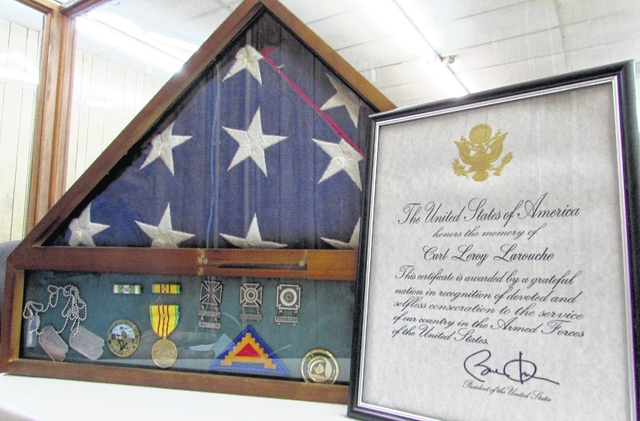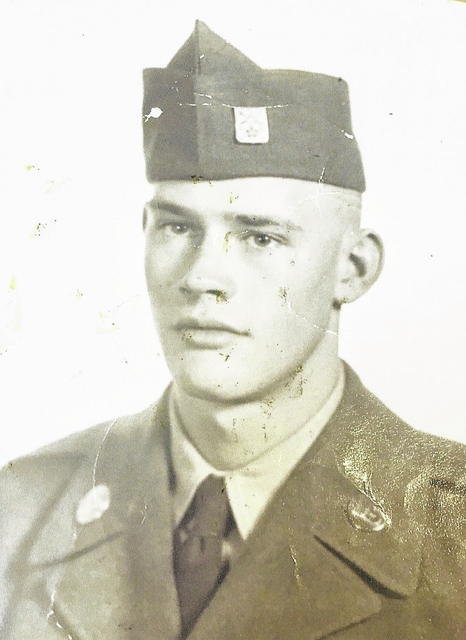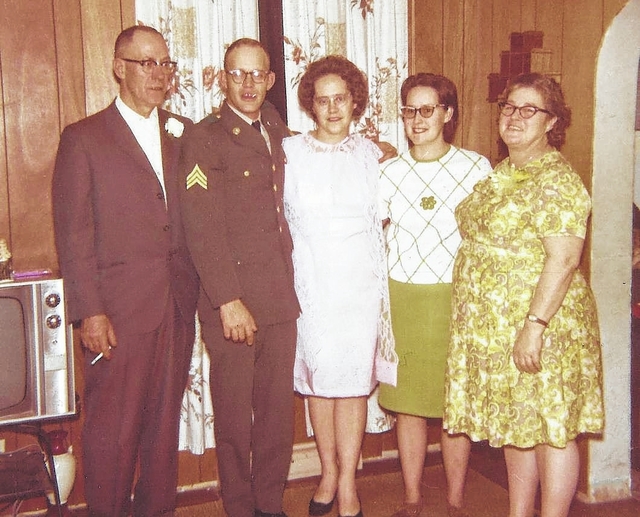Carl Leroy LaRouche was a nomad. He was a mystery. He was a drinker. He was struck dead at 55 by a stray bullet from a neighbor. He was also an American hero, and recently was the subject of a letter of recognition from the president.
A U.S. Army veteran and mechanic by trade, LaRouche finished his life in Sampson County, passing on his love for machinery to son Louis, who works for Herring Brothers in Clinton. Louis was surprised to receive a large manila envelope in the mail recently. “Do not bend,” it stated in print on the envelope. He removed the item from the cardboard sleeve meant to keep it uncreased.
“The United States of America honors the memory of Carl Leroy LaRouche,” the enclosed certificate read. “This certificate is awarded by a grateful nation in recognition of devoted and selfless consecration to the service of our country in the Armed Forces of the United States.”
The letter was signed by President Obama.
It was the most recent of recognition Louis has received on behalf of his father. In 2014, Carl’s sister Sandra Ferski wrote to Congress requesting her brother’s military records. In her request, she said her brother never talked about his achievements.
“Carl never told his family about the medals he was presented,” wrote Ferski, who is Louis’ aunt. “I want to present them to his only son. He should know and pass the history on to his sons.”
Just two short months later, Ferski received a slew of hardware: a Good Conduct Medal; National Service Defense Medal; Vietnam Service Medal with one silver service star; Republic of Vietnam Campaign Ribbon; Driver and Mechanic Badge with Mechanic Bar; Sharpshooter Badge with Rifle Bar; and Marksman Badge with Antiaircraft Artillery Bar and Carbine Bar.
She also received a letter from Bill Huizenga, member of Congress, sharing his gratitude for Carl’s service.
“I especially want to thank you for your brother’s time of service to our country. Your brother’s sacrifice has enabled generations of Americans the opportunity to enjoy their unalienable rights to life, liberty and the pursuit of happiness,” Huizenga stated. “We are all indebted to his service and will do our due diligence to maintain the freedoms that his service so selflessly provided for us.”
Louis has all the documents, the military records, the letters, the medals and their descriptions, and proudly shares them. Ferski collected the medals and put them in a display case for Louis, who also has the flag presented at his father’s funeral in 1993 in the same display.
He said the honors, the medals, the letters — all of it — help honor a man who like other Vietnam veterans was not appreciated during his time. Carl spent 17 years in the Army, from 1954-71, serving across this country and overseas, from France to Vietnam. Along the way, he was a decorated soldier.
“He just had them in a box and never displayed them,” Louis said of the medals. “We never saw them after his death in 1993.”
Louis said his father was withdrawn for periods in his post-military life, going on “drinking binges” to a point where Louis would have to go back to Michigan to live with Ferski for months at a time. Older now, he can understand the toll that post-traumatic stress took on his dad.
“I can imagine Vietnam changing somebody. It was nothing to play at, a war nobody wanted,” said Louis. “They spit at him when he got back and called him a baby killer. He stripped himself of that and tried to become a civilian again. Now they honor you and give you a standing ovation.”
His PTSD was further compounded when Louis’ younger brother drowned, causing him to slip into depression. He ultimately split with Louis’ mother and was a mechanic at Jackson’s Auto in northern Sampson County at the time of his death.
Carl LaRouche was shot and killed in the Ardell Jackson Trailer Park, located about 10 miles north of Clinton, in 1993. The 64-year-old man who shot LaRouche had been drinking and firing shots through the walls of his mobile home, located next door — a mere eight feet away — to where LaRouche was living.
When LaRouche walked over to see what was going on, the elderly neighbor shot through the wall once more, the bullet from the .38-caliber revolver striking LaRouche in his left side. He was dead when rescue workers arrived. The man was initially charged with murder, but ultimately served just two and a half years in prison on a manslaughter conviction.
Louis’ mother just passed away recently. Despite the immense amount of tragedy, Louis said he always loved his father.
“I always loved my dad. I can understand more of what he went through,” he said, noting the positive impact the honors from the president and Congress have had. “If he was able to see that I don’t think he would have been do bad on the drinking like he was when he died. Maybe he wouldn’t have been so bad off.
“It’s sad it had to be so long after his death.”
The recognition has been for his father, but they have meant the world to Louis, who was born a military brat in Germany. He moved everywhere, recalling even after his dad was out of the military how “an issue” would come up and his father would go to the map and randomly point out the family’s next destination. He never stayed anywhere for too long and knew better to get attached to friends he would have to leave at a moment’s notice.
Louis recalled the drinking and the problems that would sometimes divide the family but he knows his dad wasn’t in the best mindset.
“You join the military to serve your country and they train you to kill,” he said. “Then you’re supposed to turn it off. It’s not an easy thing to do.”
Honoring his father, even though posthumously, takes some of the bad taste out of Louis’ mouth.
“It makes me more of a positive thinker toward the government. I used to think they didn’t do enough for the military,” said Louis, whose father’s death in 1993 hit him especially hard. “It’s been long enough now I can cope with it a little better but it was tough.”
On the way to work last summer, Louis got a call from a woman. It was his half-sister, his father’s daughter from another relationship. He discovered he had two half-sisters. With Ferski essentially the only extended family with whom he communicated, Louis said it was nice to be able to have others who knew his father. They recalled how kind his father was, how he went out of his way to help others as best he could. That was the man Louis loved.
When Louis’ mother died in April, his new family went to the funeral in Michigan. Louis was blown away by the gesture.
“I didn’t even know I had sisters, and they are awesome,” he said. “I have aunts, uncles, cousins in Michigan, California, Arizona, Florida … now I’ve met all these relatives and they have fond memories of him. It’s nice.”



